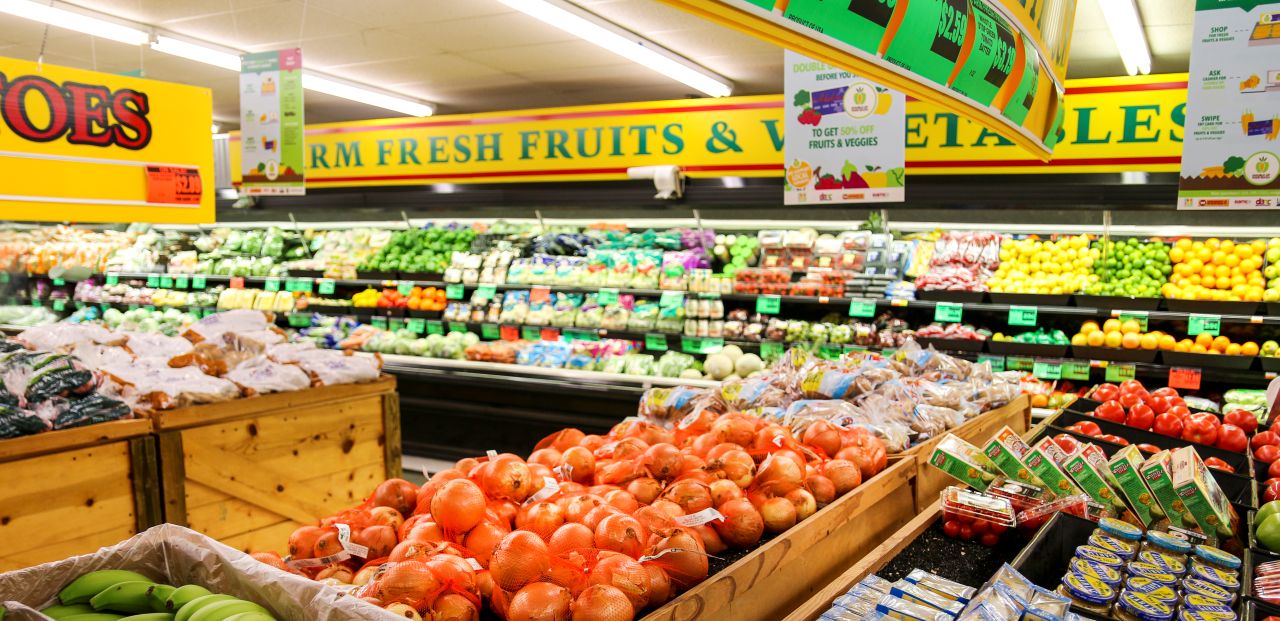Double Up Food Bucks Alabama is enhancing communities by making fresh local produce more affordable and accessible at select grocery stores and farmers markets. The program is funded in part by the U.S. Department of Agriculture (USDA) with matching funds from state and philanthropic sources and is administered by the Hunger Solutions Institute at Auburn University. It doubles Supplemental Nutrition Assistance Program (SNAP) participants’ purchasing power for fresh fruits and vegetables.
Double Up Food Bucks Alabama gives SNAP participants the opportunity to stretch their food assistance dollars if they purchase fresh fruits and vegetables at participating retailers. In Alabama, four independent grocery stores, two community-supported-agriculture programs, two farm stands and eight SNAP-authorized farmers markets participate in Double Up Food Bucks Alabama.
“This program works so well because it benefits everyone involved. The SNAP participants are incentivized to make healthier food choices, and local grocery stores and farmers markets see increased revenue,” said Joel Cuffey, assistant professor and agricultural economist at Auburn University.
Chilton, Dallas, Jefferson, Lee, Madison, Marshall, Mobile, Sumter and Tuscaloosa counties all have one or more Double Up Food Bucks retailer. Jefferson, Madison and Mobile counties are among the most populated in the state. This makes Double Up Food Bucks retailers accessible to thousands of people in Alabama.
The Hunger Solutions Institute (HSI) is part of the Alabama Agricultural Experiment Station and the College of Human Sciences at Auburn University. The institute seeks to promote development, adoption and advancement of innovative best practices to address food and nutrition security. As an academic center on Auburn University’s campus, HSI leverages collective efforts in teaching, research and outreach to achieve its mission.
In select grocery stores, when SNAP shoppers pay for fresh fruit and vegetables with their EBT card, they receive a coupon for an equivalent amount of fresh fruit and vegetables that they can use on a future transaction. At participating farmers markets, SNAP shoppers receive additional Double Up tokens when they swipe their EBT card and receive SNAP tokens. The Double Up tokens can be used along with SNAP tokens to purchase fresh fruit and vegetables. This process effectively doubles the amount that SNAP customers at farmers markets can buy from local farmers.
Double Up Food Bucks Alabama is funded in part by the USDA Gus Schumacher Nutrition Incentive Program (GusNIP). GusNIP provides grant funding that is used to incentivize fresh produce purchases by SNAP households. These grant programs create opportunities to enrich communities by reducing food insecurity and helping to lower the risk of diet-related diseases. In addition, GusNIP also provides cooperators with training and educational support to help them maximize the impact of their grant programs.
Federal and state-funded programs like Double Up Food Bucks Alabama provide much needed revenue for local farmers while also combating food insecurity and malnutrition. For that reason, continued funding from these programs is critical to supporting farmers and boosting local economies during uncertain economic times.
“Research consistently supports the role of a nutritious diet in maintaining good mental and physical health. Consumption of fresh produce would likely increase the health of the people participating in the program,” Cuffey said. “Double Up Food Bucks Alabama increases fresh produce consumption and also helps Alabama residents facing financial hardship to buy sufficient food.”
Investments in Alabama citizens’ nutrition is vital for a healthy workforce. Without reliable access to nutritious food, individuals may suffer from health risks that weaken their immune systems and increase the likelihood of chronic diseases. Therefore, encouraging SNAP participants to purchase more fresh produce for themselves and their families is a necessary step in improving nutrition and overall health in Alabama. Katie Funderburk, assistant director of federal nutritional programs for Alabama Cooperative Extension, highlighted the benefits of Double Up Food Bucks Alabama. Funderburk emphasized how the program encourages healthier choices.
“Double Up Food Bucks [Alabama] helps remove a barrier to shopping for healthy food by making it more affordable. One of the most common reasons people report for not eating healthier is the expense of food,” Funderburk said. “Programs like this are important because they allow shoppers to double the value of their food dollars when purchasing fruits and vegetables they might otherwise have forgone.”
In addition, Double Up Food Bucks Alabama supports the state’s fruit and vegetable growers by building a customer base and boosting their bottom line. As a result, the program directly connects local farms with farmers markets and independent grocers, strengthening Alabama’s agricultural industry. According to a two-year overview report, the economic impact of Double Up Food Bucks Alabama was approximately $375,000.
SNAP customers can find guidance about participating in Double Up Food Bucks Alabama through the Auburn University Hunger Solutions Institute and from Alabama Extension. SNAP customers can find participating retailers on the Double Up Food Bucks Alabama website. Moreover, Extension professionals and SNAP-Ed educators offer educational resources to help people incorporate healthier eating into everyday life.
“SNAP-Ed educators provide nutrition education to customers in stores and farmers markets where Double Up Food Bucks (Alabama) is available,” Funderburk said. “They conduct recipe demonstrations and offer a sample or taste of produce to encourage shoppers to utilize the Double Up Food Bucks to purchase and prepare healthy foods at home.”
Hunger Solutions Institute also administers End Child Hunger in Alabama, Presidents United to Solve Hunger, Hunger Free Higher Ed, and Add Milk to combat food insecurity. As a result, these initiatives work to provide sustainable hunger relief and improve access to nutritious food across Alabama and beyond.
In fact, Hunger Solutions Institute has secured more than $15 million since 2020. As a result, its initiatives and research activities involve collaborations with more than 50 university partners and external organizations. Double Up Food Bucks Alabama is playing a vital part in the Institute’s goal of fighting hunger in local communities.
“Spreading the word about Double Up is how we keep it growing. The more SNAP users who participate, the more Alabama agricultural producers’ profit,” Cuffey said. “As we continue to conduct economic research and administer these types of grant initiatives we can contribute to the fight against food insecurity.”
To find out more about Double Up Food Bucks Alabama and the map for local retailers:
https://hsi.auburn.edu/au-dufb/





